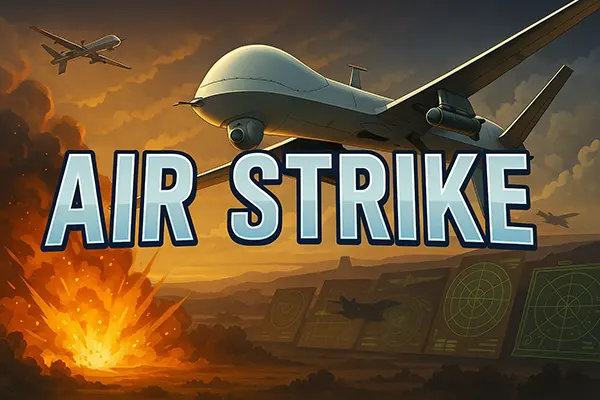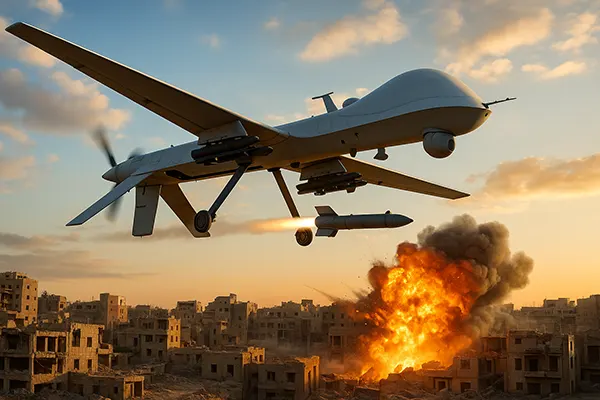
Air Strike: New Wazdan Slot and Real Drones — Where’s the Line?
The line between digital entertainment and real-world technology continues to blur, and Wazdan’s latest release, “Air Strike,” exemplifies this growing intersection. While the game draws inspiration from military drone technology, it raises important questions about the ethical and cultural boundaries of using such themes for amusement. In this article, we explore the game’s mechanics, aesthetics, and implications — and examine how close it comes to replicating real-world drone warfare.
The Inspiration Behind the Game
Wazdan, known for creating immersive slot games with innovative mechanics, has taken a bold direction with “Air Strike.” The slot is heavily themed around tactical drone missions and aerial combat — elements closely tied to modern military operations. The design borrows visual and audio cues from drone reconnaissance footage, aircraft radars, and mission briefings, making the gaming experience feel startlingly close to real-life scenarios.
The developers have clearly invested in research, aiming to reflect the precision and intensity of drone operation without glorifying war itself. The question, however, is whether a game can realistically portray such sensitive subjects without trivialising them. Unlike previous military-themed slots, “Air Strike” does not fictionalise its setting — instead, it attempts to simulate it with high realism.
This realism has triggered a mixed response. While some players admire the technical excellence, others question whether such themes should be used for entertainment at all. Is it innovation, or insensitivity? This remains an open debate within both the gaming and broader cultural community.
Player Reactions and Industry Commentary
Initial reactions to “Air Strike” have been divided. On gaming forums, some users praise its interactive bonus rounds and attention to detail, while others raise concerns about desensitisation to violence. The industry itself has not reached consensus. Some argue that Wazdan is pushing creative boundaries, while others feel the topic may be too serious for casual gaming.
Critics from ethical gaming initiatives have highlighted the risk of normalising military conflict through repeated exposure to gamified combat scenarios. At the same time, developers defend their work by pointing out the historical use of war themes in games — from strategy to shooters. However, the use of real-world drone aesthetics introduces a new level of controversy due to their real-life consequences.
Meanwhile, regulatory bodies in several countries are watching the situation closely. Though no direct action has been taken as of June 2025, discussion about possible content guidelines for themes related to modern warfare in gambling games is ongoing.
Visuals, Gameplay, and Technical Aspects
“Air Strike” is powered by Wazdan’s cutting-edge engine, delivering a 5×3 reel setup with up to 20 configurable paylines. The game stands out through its unique volatility level control, allowing players to choose between low, standard, and high variance settings — a Wazdan trademark. These settings can dramatically alter the session’s tempo, accommodating different playstyles and bankroll strategies.
The game’s graphical fidelity is among the best seen in Wazdan’s portfolio to date. Each spin is accompanied by animated drones, dynamic weather effects, and soundtrack elements that simulate mission control operations. This intense realism can be both captivating and overwhelming, depending on player expectations.
Bonus features include a Free Spins mode with guided missile animations, a “Surveillance Bonus” that imitates target locking, and a Gamble Feature with military briefcase visuals. All of these contribute to a highly thematic experience — but again raise the question: how close is too close to real military simulation in entertainment?
Balancing Realism with Responsibility
Developers face a delicate balancing act. While technical accuracy and thematic depth can enrich gameplay, they also carry the risk of emotional detachment from the serious real-world contexts being mimicked. “Air Strike” flirts with this boundary, offering players a well-constructed environment that may not be easily separated from its inspiration in modern warfare.
Wazdan has not issued a formal statement on whether it consulted military ethics experts or cultural advisors during development. However, internal sources suggest the creative team considered several alternative directions before finalising the drone warfare theme. Whether that process was adequate remains under public scrutiny.
As of June 2025, the gaming community continues to debate whether this approach is visionary or problematic. What’s clear is that “Air Strike” has started conversations far beyond traditional slot reviews — touching on ethics, media responsibility, and the evolving role of games in society.

Wider Context: Military Themes in Gaming
The use of military themes is not new in gambling, but the growing realism facilitated by modern graphics engines and machine learning has changed the landscape significantly. From abstract battlefield icons to lifelike drone footage, the shift in tone is unmistakable. This progression invites both innovation and responsibility, and developers must navigate both dimensions carefully.
As of mid-2025, several other developers — including Relax Gaming and ELK Studios — are exploring similar military themes, but few have reached the same level of realism as Wazdan’s “Air Strike.” The trend seems to indicate that this genre may expand further, especially if audiences respond with engagement rather than discomfort.
However, this growth will likely depend on regulatory tolerance and public reaction. Should lawmakers or gaming commissions determine that certain content risks normalising violence or exploiting sensitive themes, they may introduce new restrictions or age ratings. Until then, studios will continue to walk a thin line between creativity and controversy.
Future Outlook and Responsible Innovation
As game developers pursue increasingly complex themes, questions about responsibility and intention will become more central. It is no longer enough to offer a polished product — the story behind the game, and the message it conveys, now play a larger role in public perception.
“Air Strike” may be the first of many similar releases, or it may become a case study in what not to do. Either way, it represents a turning point in thematic risk-taking within the gambling industry. Audiences are more informed, more critical, and more engaged than ever before — and their feedback will shape what comes next.
For Wazdan, the reception of “Air Strike” could determine future decisions about game design, especially when touching on real-world events. It is a defining moment, not just for one title, but for the philosophy behind an entire generation of gambling entertainment.
